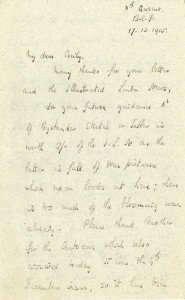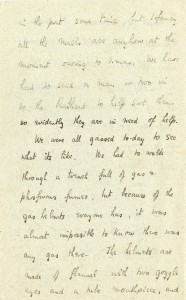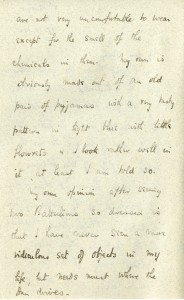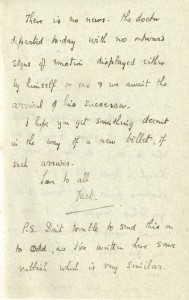Transcription
8th Queens.
B. E. F.
17. 12. 1915.
My dear Cecily,
Many thanks for your letter and the Illustrated London News. For your future guidance 6d of Bystander Sketch or Tatler is worth 2/- of the I. L. N. as the latter is full of war pictures which no one looks at here; there is too much of the blooming war already. Please thank Mother for the Autocar, which also arrived to-day. It was the 4th December issue, so it has been in the post some time, but I fancy all the mails are anyhow at the moment owing to Xmas. We have had to send a man or two in to the Railhead to help sort them – so evidently they are in need of help.
We were all gassed to-day to see what it’s like. We had to walk through a trench full of gas & phosferous fumes, but because of the gas helmets everyone has, it was almost impossible to know there was any gas there. The helmets are made of flannel with two goggle eyes and a tube mouthpiece, and are not very uncomfortable to wear except for the smell of the chemicals in them. My own is obviously made out of an old pair of pyjamas with a very tasty pattern in light blue with little flowrets & I look rather well in it, at least I am told so.
My own opinion after seeing two Battalions so dressed is that I have never seen a more ridiculous set of objects in my life, but needs must where the Hun drives.
There is no news. The doctor departed to-day with no outward signs of emotion displayed either by himself or us & we await the arrival of his successor.
I hope you get something decent in the way of a new billet, if such arrives.
Love to all
Jack.
P. S. Don’t trouble to send this on to Odd, as I’ve written here some rubbish which is very similar.
Commentary
The long awaited gas drill has taken place with no casualties of the men. From Peirs’s description, the men put their chemically saturated flannel gas masks on and then walked through a trench with gas. The purpose was to get men used to wearing their masks and moving with them on and to orient themselves in a trench with flannel bags over their heads. Peirs clearly found the exercise to be ridiculous, but as he indicates, the German introduction of gas warfare in April 1915, meant that this was a fact of their combat existence and something they had to get used to.
One other interesting point is that Peirs mentions that he’s not interested in the Illustrated London News because it is full of war pictures and he has had enough of war imagery. Reading the Autocar or the Tatler was a means of escape and enjoyment while reading a periodical that reported the war was bound to frustrate him.




